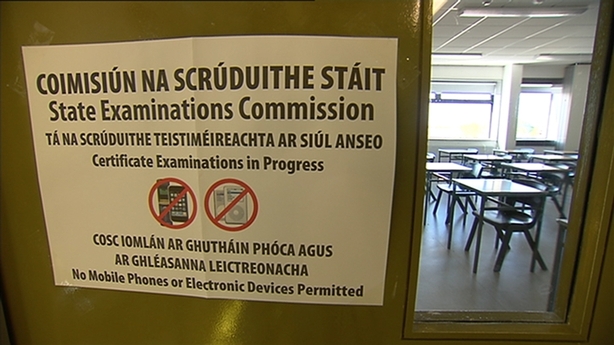Changes to the Leaving Certificate grading system have led to a widening of the achievement gap between disadvantaged or DEIS and other schools, according to an ESRI study.
The institute also said the grading system may be causing "demoralisation" and stress among some students.
ESRI Research Professor Emer Smyth said that overall grades have not improved, but a greater number of students are being exposed to more complex material through higher level courses.
Speaking on RTÉ's Morning Ireland, she said that students who stick with higher level courses fell that some of the subject, particularly maths, are occupying a lot of their time, while those students studying at ordinary level feel the gap is too great.
We need your consent to load this rte-player contentWe use rte-player to manage extra content that can set cookies on your device and collect data about your activity. Please review their details and accept them to load the content.Manage Preferences
"Many of them feel that the gap is too great between higher and ordinary level and that doesn't really fairly reflect the kind of work load they are taking on.
"So they kind of feel that no matter how well they do, or how hard they work, there's a limit to the the grades and the points that they can achieve."
It finds that while the changes have led to an increase in the number of students opting for higher level papers, which was one aim of the reforms, this has not been accompanied by improvement in attainment.
Students have also reported feeling additional pressure to opt for higher level papers as a result of the changes.
Prof Smyth said that students in DEIS schools have not gained in the way they should have under the new changes, but this can be traced back to the junior cycle, which shows that there are big differences between DEIS and other schools at the take-up of higher level at junior level.
In 2017, the old alphabetical system of grading bands was replaced by a numerical one, with significantly fewer bands.
The new structure also for the first time awarded CAO points to students who achieved 30-39% in a higher level paper, a H7 under the new system.
This was to encourage more students to sit higher level papers. Previously, there were no CAO points awarded for a mark under 40%.
This study compares the results of the past two years - under the new system - with the outcomes of previous years.
It finds that while in general students adopted the new grading scheme without much difficulty, increased higher level subject take-up has not translated into increased attainment.
Looking at Maths and Irish, the study found a significant drop in grades in both subjects at higher level as more students opted for those papers.

The results also reveal a growth in inequality between DEIS and non-DEIS schools with the gap in CAO points achieved by students in the different sectors widening.
It finds a greater decline in the higher level Maths results obtained by students from disadvantaged backgrounds or attending DEIS schools. By contrast, there is no decline in Maths results achieved in what they ESRI described as "Irish-medium schools".
The study says school size also has an impact, with students attending larger schools faring better in terms of English and Maths performance and overall points achieved.
As part of the study, ESRI researchers spoke to sixth year students and teachers in ten schools, who were selected to be representative of the post primary sector as a whole in terms of gender and socio-economic make up.
It gathered their views on the new system, as well as aspects of the Leaving Certificate process in general, such as the awarding of bonus CAO points for higher level Maths.
The impact of the grading changes on students choosing between higher and ordinary level papers was, according to the study, "the subject of considerable debate among students and teachers across all the case-study schools".
It reports that both higher and lower-performing students felt the gap between the points awarded for higher and ordinary papers was too wide and that ordinary level points did not fairly reflect the workload and effort involved.
The 2017 changes saw the maximum number of points awarded for ordinary level papers reduced and some students complained of a negative impact in terms of their motivation, engagement and academic self-image.
"If you’re doing ordinary you might as well drop it … If you’re doing mostly higher, then ordinary level just doesn’t pay." (Student)
Students and teachers spoke about the incentives offered for persevering with higher level courses, particularly for Maths in terms of bonus points, but also in terms of points now awarded for lower marks in those papers.
While some supported the concept of bonus points, others felt it was unfair to solely incentivise this one subject.
"I’m not too sure about the 25 points for the Maths, because like surely there’d be a better way to influence people to do it, because like it obviously is like influencing people to do it but it’s just kind of giving people that aren’t doing it disadvantage." (Student)
"Because of the extra 25 points you have a lot of students who are in the class who are not able, perhaps, for the level that they’re at. Because that’s the carrot for them, gaining the extra 25 points despite the fact that they mightn’t be able." (Teacher)
Students suggested that the large discrepancies in points for higher and ordinary level subjects were unfair for lower-attaining students.
According to this report "the negative self-image of lower-performing students was further reinforced by the dominance of the 'points race' and the perceived excessive emphasis on maximising achievement in the exams".
"It doesn’t really matter for me what subjects I study, it’s my points … Like I’m not interested in most of the subjects I am studying, it’s just my points that I have to keep up." (Student)
Staff at the schools also spoke about the "fixation of students on marking schemes and the value of rote learning in maximising their performance".
"That’s [points] always on their minds, you know. Even when you’re going through exam papers they’re on about marks: accumulating marks … Where will I lose, where can I gain marks?" (Teacher)
The report speaks of the "normalisation" of grinds, which were prevalent across all ten of the schools researchers visited.
In its conclusions the report states that:
- While the changes introduced in 2017 have fulfilled one of their aims in increasing the take-up of higher level subjects, "it is not clear that this outcome is a positive one for all students, particularly if they struggle to meet the requirements of the higher-level course".
- The "perceived downgrading" of ordinary-level papers, and associated CAO points, and the "demoralisation" of students studying subjects at ordinary level "suggest the need for a re-examination of the rationale for separate subject levels".
The report makes a number of wider conclusions too:
- It says its findings highlight "the crucial importance of ensuring high expectations for all students from the outset in second level".
- It refers to the constraints faced by smaller post primary schools whose size can prevent them from offering higher level subject provision. The report says this raises "important issues of policy", and suggests that the "clustering" of schools might be one way of addressing this.






